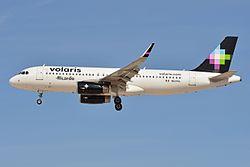Volaris Ends All Monterrey-US Flights: A Major Change in Mexico’s Air Travel Scene
In a notable development within Mexico’s aviation sector, low-cost airline Volaris has decided to discontinue all flights connecting Monterrey—a key industrial and commercial center in northern Mexico—to destinations across the United States. This strategic pivot signals a considerable shift from the airline’s previous route structure and is poised to influence travel patterns, business activities, and regional connectivity. As Volaris reallocates its focus toward other markets, questions arise regarding the underlying causes of this decision and its broader consequences for cross-border mobility. Known for affordable fares and accessible service, Volaris’ withdrawal from these routes may reshape the landscape of budget air travel serving Monterrey.
Volaris Route Termination: Understanding the Shift Away from US Destinations
The recent announcement that Volaris will cease all US-bound flights originating from Monterrey represents a significant recalibration of its operational priorities. Industry experts attribute this move to several intertwined factors such as diminished passenger demand on these corridors, rising operational expenses—including fuel costs—and intensified competition from rival airlines offering similar or more attractive services. As a carrier focused on cost-efficiency and profitability optimization, Volaris appears to be concentrating resources on routes with higher yield potential. The immediate fallout primarily affects business commuters and expatriate communities who have relied heavily on direct connections between Monterrey and major American cities.
Travelers holding reservations for now-canceled flights are being provided with options including full refunds or alternative bookings; however, many express dissatisfaction due to the sudden nature of these changes disrupting their plans. This scenario reflects an emerging trend in global aviation where agility in route management becomes essential amid fluctuating market conditions. Below is an overview of the terminated flight paths:
| Discontinued Route | Destination City | Traveler Impact | ||||||||||
|---|---|---|---|---|---|---|---|---|---|---|---|---|
| Monterrey – Los Angeles | Los Angeles, California | Catering largely to corporate travelers | ||||||||||
| Monterrey – Chicago | Chicago, Illinois | A vital link for Mexican expatriates residing in Chicago area | ||||||||||
| Monterrey – Dallas/Fort Worth | Dallas, Texas | < td >Frequently used by families visiting relatives< / td >
| Industry Sector | Likely Consequence | |||||||
|---|---|---|---|---|---|---|---|---|
| Main Focus Area th > | Recommended Action Plan th > tr > | ||
|---|---|---|---|
| Connectivity Enhancement | Establish code-share agreements & interline partnerships | tr > | |
| Technology Upgrades | Conclusion: What Lies Ahead For Air Travel In And Out Of Monterrey?
To summarize, México’s budget airline giant Volaris has embarked upon a strategic realignment by withdrawing all US-bound services departing from Monterrey International Airport. This move underscores ongoing efforts within the industry aimed at streamlining operations amidst volatile demand fluctuations exacerbated by global economic shifts since COVID-19. While this change presents immediate inconveniences—particularly impacting frequent flyers reliant upon direct access—it also opens avenues encouraging innovation among local businesses striving towards resilience through diversification. As air transport continues adapting worldwide—with trends favoring flexible scheduling technologies integration sustainability—the region must remain vigilant monitoring how these developments affect not only passenger volumes but also broader economic vitality. We will continue providing timely updates regarding further evolutions related both directly & indirectly affecting air connectivity between northern Mexico’s industrial heartland & key international markets. |
